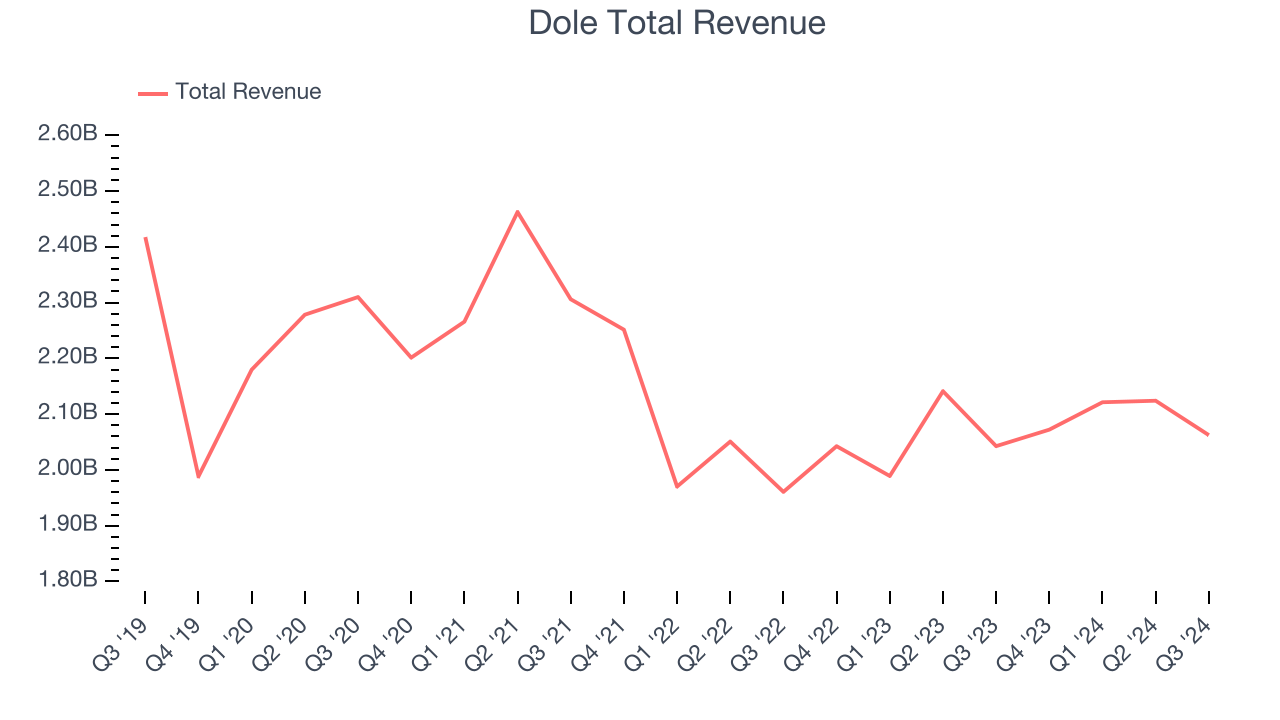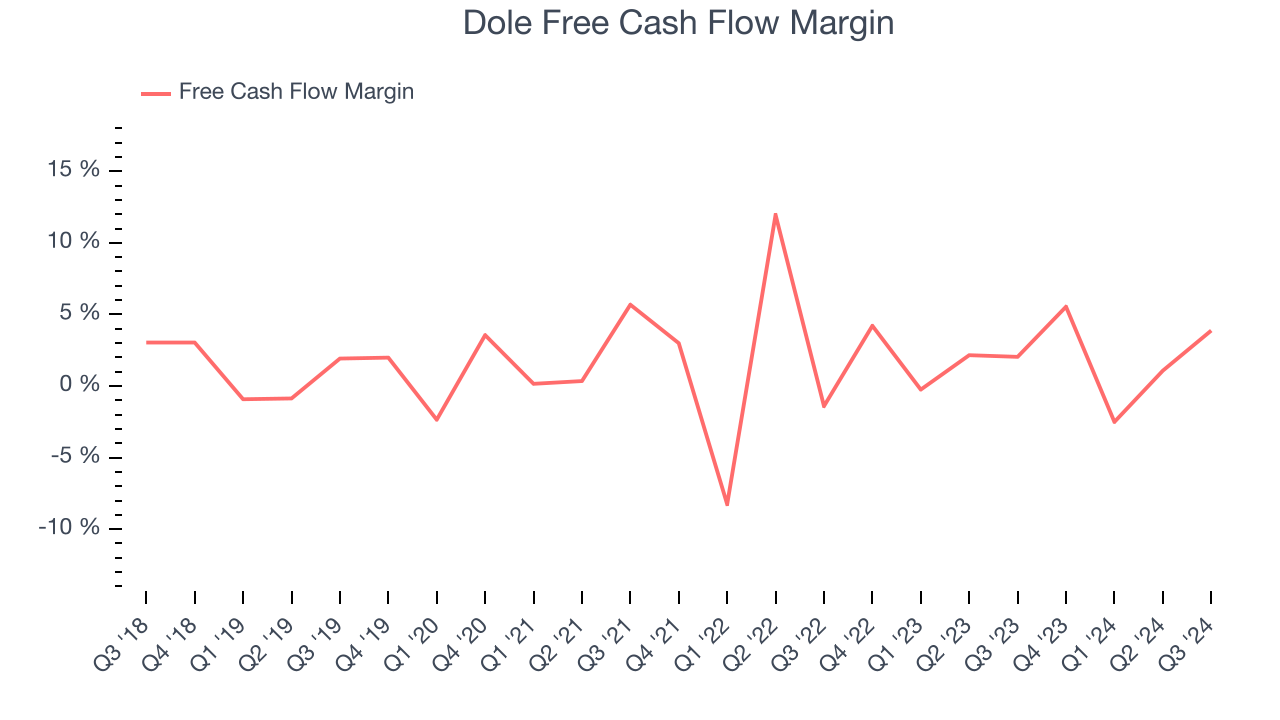
Fresh produce company Dole (NYSE: DOLE) reported Q3 CY2024 results exceeding the market’s revenue expectations, but sales were flat year on year at $2.06 billion. Its non-GAAP profit of $0.19 per share was 4.4% below analysts’ consensus estimates.
Is now the time to buy Dole? Find out by accessing our full research report, it’s free.
Dole (DOLE) Q3 CY2024 Highlights:
- Revenue: $2.06 billion vs analyst estimates of $2.00 billion (3.2% beat)
- Adjusted EPS: $0.19 vs analyst expectations of $0.20 (4.4% miss)
- EBITDA: $82.07 million vs analyst estimates of $80.99 million (1.3% beat)
- EBITDA guidance for the full year is $380 million at the midpoint, in line with analyst expectations
- Gross Margin (GAAP): 8%, in line with the same quarter last year
- Operating Margin: 2.3%, in line with the same quarter last year
- EBITDA Margin: 4%, in line with the same quarter last year
- Free Cash Flow Margin: 3.9%, up from 2% in the same quarter last year
- Market Capitalization: $1.59 billion
1 Like-for-like basis refers to the measure excluding the impact of foreign currency translation movements and acquisitions and divestitures. 2 Dole plc reports its financial results in accordance with U.S. Generally Accepted Accounting Principles ("GAAP").
Company Overview
Cherished for its delicious, world-famous pineapples and Hawaiian roots, Dole (NYSE: DOLE) is a global agricultural company specializing in fresh fruits and vegetables.
Perishable Food
The perishable food industry is diverse, encompassing large-scale producers and distributors to specialty and artisanal brands. These companies sell produce, dairy products, meats, and baked goods and have become integral to serving modern American consumers who prioritize freshness, quality, and nutritional value. Investing in perishable food stocks presents both opportunities and challenges. While the perishable nature of products can introduce risks related to supply chain management and shelf life, it also creates a constant demand driven by the necessity for fresh food. Companies that can efficiently manage inventory, distribution, and quality control are well-positioned to thrive in this competitive market. Navigating the perishable food industry requires adherence to strict food safety standards, regulations, and labeling requirements.
Sales Growth
A company’s long-term performance is an indicator of its overall business quality. While any business can experience short-term success, top-performing ones enjoy sustained growth for multiple years.
Dole is one of the larger consumer staples companies and benefits from a well-known brand that influences consumer purchasing decisions. However, its scale is a double-edged sword because there are only a finite number of major retail partners, placing a ceiling on its growth.
As you can see below, Dole struggled to generate demand over the last three years. Its sales dropped by 3.2% annually, showing demand was weak. This is a poor baseline for our analysis.

This quarter, Dole’s $2.06 billion of revenue was flat year on year but beat Wall Street’s estimates by 3.2%.
Looking ahead, sell-side analysts expect revenue to remain flat over the next 12 months, an improvement versus the last three years. While this projection indicates its newer products will catalyze better performance, it is still below the sector average.
Here at StockStory, we certainly understand the potential of thematic investing. Diverse winners from Microsoft (MSFT) to Alphabet (GOOG), Coca-Cola (KO) to Monster Beverage (MNST) could all have been identified as promising growth stories with a megatrend driving the growth. So, in that spirit, we’ve identified a relatively under-the-radar profitable growth stock benefitting from the rise of AI, available to you FREE via this link.
Cash Is King
Although earnings are undoubtedly valuable for assessing company performance, we believe cash is king because you can’t use accounting profits to pay the bills.
Dole has shown weak cash profitability over the last two years, giving the company limited opportunities to return capital to shareholders. Its free cash flow margin averaged 2%, subpar for a consumer staples business.
Taking a step back, we can see that Dole failed to improve its margin during that time. Its unexciting margin and trend likely have shareholders hoping for a change.

Dole’s free cash flow clocked in at $79.89 million in Q3, equivalent to a 3.9% margin. This result was good as its margin was 1.8 percentage points higher than in the same quarter last year, but we wouldn’t read too much into the short term because investment needs can be seasonal, leading to temporary swings. Long-term trends carry greater meaning.
Key Takeaways from Dole’s Q3 Results
We enjoyed seeing Dole exceed analysts’ revenue expectations this quarter. We were also glad its EBITDA outperformed Wall Street’s estimates. On the other hand, its EPS missed analysts’ expectations. Zooming out, we think this was a mixed quarter, and the stock traded down 3.9% to $16.13 immediately following the results.
So should you invest in Dole right now? What happened in the latest quarter matters, but not as much as longer-term business quality and valuation, when deciding whether to invest in this stock. We cover that in our actionable full research report which you can read here, it’s free.




